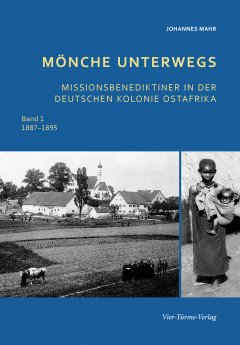The Campo Santo Teutonico and the first Missionary Benedictines
Johannes Mahr has described the first 18 years of the history of the Missionary Benedictines (of St. Ottilien) in an 850-page basic work. The brilliant volume, adorned with hundreds of historical illustrations, is the result of an immense amount of work. It is very readable and introduces in detail the mentality of the times and the first mission years in Africa, with all the light and shade.
One drawback is, of course, that this is not a trained historian's work. Archival documents and grey writings are widely used, but the sources are not specified. One does not learn from which archives the author draws. It is therefore practically impossible to verify the statements. The author was more interested in good readability and less in a scientific apparatus.
At least the index of names allows one to quickly come across the relationship of the founder of the Missionary Benedictines, Father Andreas Amrhein, with Campo Santo Teutonico, which is important here. In fact, the first Missionary Benedictines were sent out from Campo Santo Teutonico in 1887. Its rector Anton de Waal, not Father Amrhein, gave the sending out retreats, the outline of which may well still be in the de Waal estate, as de Waal kept the scrawling notes of his countless retreats (mostly for nuns).
14 Benedictines stood unannounced at the door of the college on 13 November 1887 - it is the same year that de Waal founded the "Römische Quartalschrift" - and had to be looked after until they could be taken to Africa. On page 60, Mahr even offers a photo of the present-day college. Paul Maria Baumgarten, who was at the college at the time, was extraordinarily interested in the Catholic missions and to a certain extent invented the subject of "mission history", described the situation in his memoirs (p. 61).
But Amrhein's contact with the College was older and went back as early as 1884. At that time he was negotiating in Rome with Propaganda Fide with a view to German East Africa (pp. 75-77).
Chapters of the book:
- Kühne Pläne und ein offener Horizont (November 1887)
- Die Klostergründung in Pugu zur Annäherung an die Afrikaner (1888-1889)
- Mühsame Orientierung in der kolonialen Gesellschaft (1889-1894)
- Neubeginn der Arbeit unter P. Maurus Hartmann (1894/95)
- Das Generalkapitel von 1895 erlaubt die Gründung von "Stationen"
Der Band wurde der Bibliothek des Campo Santo geschenkt.
- Details
- Written by: Stefan Heid
- Category: Recommended reading
 Römisches Institut der Görres-Gesellschaft
Römisches Institut der Görres-Gesellschaft







